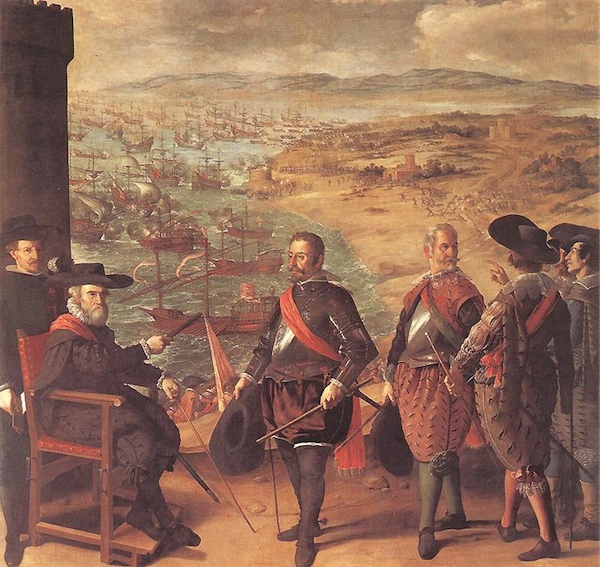
Pues la guerra está en las manos
y para guerra nacemos
bien será nos ensayemos
para vençer los tiranos.
El capitán desta lid
de nuestra parte, sabed
que es el Hijo de David
y de la otra es Luzbel,
y podráse dezir d’él
sin que nadie lo reproche:
“Quien bien tiene y mal escoge,
por mal que le venga no s’enoje”.
Esta es guerra de primor
do se requiere destreza.
Pregónese con presteza
con pífano y atambor:
…
¡Sus! poned l’artillería
de devotos pensamientos
con guarda de mandamientos
démosle la batería.
Las trincheras bien están,
hazia acá esse tiro gruesso!
Oh que tiene tan gran peso
que no le derribarán!
Bien está, ponedle fuego,
y luego, luego… Bom, bom
Peti, pató, bom bom…
Suelte la arcabuzería,
Tif tof, tif tof…
La muralla se derriba
por arriba
¡Sus! a entrar,
que no es tiempo de tardar,
qu’el capitán va delante
con su ropa roçegante,
ensangrentada,
nadie no vuelva la cara
¡Sus! ¡arriba! ¡Viva, viva!
Los enemigos ya huyen,
¡a ellos, que van corridos y vencidos!
¡Santiago! ¡Victoria, victoria!
“Haes est victoria quae vincit
mundum fides nostra”.
Since war is at hand
And for war we are born,
We had better be in training
To defeat the tyrants.
The captain in this combat,
On our side, let it be known,
is the Son of David,
And on the other side, it’s Lucifer.
And one could say of him,
Without anyone objecting:
“He who has good, and chooses evil,
Can’t complain if he gets back evil.”
This is a noble war,
Which demands great skill.
Anounce it swiftly,
With fifes and drums:
….
You, bring up the artillery of devout thoughts,
With the battery of the Commandments observed.
Let’s put up a good fight!
The trenches are good.
Turn the heavy piece this way!
Oh, it’s so heavy
They’ll never manage it!
It’s fine, light the fuse!
And then, then, then, then,
bom, bom, peti, pata…
fire the handguns,…
The wall is tumbling
Down top-first!
You, go inside,
No time to waste,
The captain is ahead,
His flowing clothes
Drenched in blood.
Let no one look back.
You, up!
Viva! Viva!
The enemies are running away.
After them,
They are vanquished!
Santiago! Santiago!
Victory! Victory!
This is the victory that conquers the world
Our faith.
—Mateo Flecha el Viejo, La Guerra (1534) first published in Las Ensaladas (1581)
For an American, the word “salad” summons visions of iceberg lettuce and tomatoes, for a Russian, chopped boiled root vegetables and mayonnaise. But for a Spaniard in the Golden Age, it would be a composition with four-line stanzas in which an array of different poetic meters are used in a somewhat mercurial fashion. A good salad may include text ripped from other poems. And it would be the height of fashion for the salad to be multilingual though best all within the Romance family group (Spanish, French, Catalan, Portuguese, Italian and Latin, for instance). That’s the recipe the Arte Poética Española of 1592 gives for making a salad.
Mateo Flecha was the great master of the art of the salad. I was first introduced to his work in a concert in a church in the ancient city of Zaragoza. The music was in four voices, and it was accompanied by the instruments associated with war, mentioned in the text–drums, fifes, trumpets. The musicians stood in front of the altar and the effect was jarring. Here was a song of praise to war, a lionization of the art of soldiering. And the call to arms was religious, the fighting was done in the name of faith. This is the music of España negra–Black Spain–the force that expelled the Jews and Moors and brutally persecuted their converted descendants, drove the conquest of the Americas and the subjugation of their indigenous peoples, that crushed the movement for religious freedom and independence in the Low Countries, that launched the Great Armada against England. It may of course be, as Joseph Pérez argues in his new book La légende noire de l’Espagne, that the excesses and intolerance found in Spain are equally to be located in the history of England, France and Germany in the same time period. But the legacy of religious bigotry and militarism in Spain was more tenacious. Once Spain was stripped of the last vestiges of her colonial empire in the last years of the nineteenth century, this was the force that drove Franco and his allies to wage the first modern war against a civilian populace–the Spanish Civil War.
Unfortunately YouTube still has no full performance of La Guerra, but here is a quick slice of the second stanza. Several recordings are available, but the best by far is Philip Pickett’s with the New London Consort.


